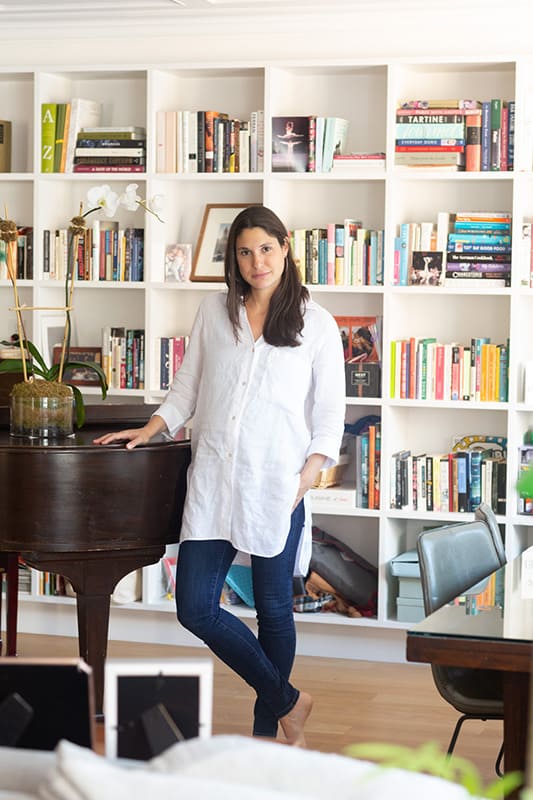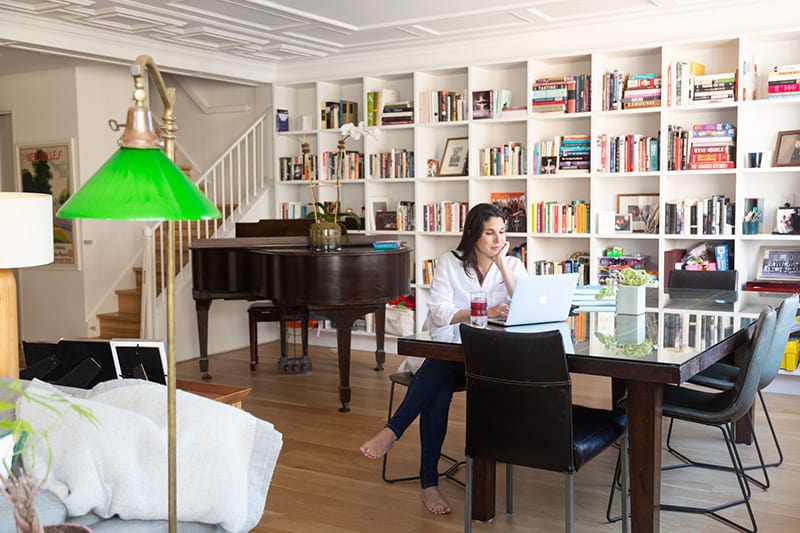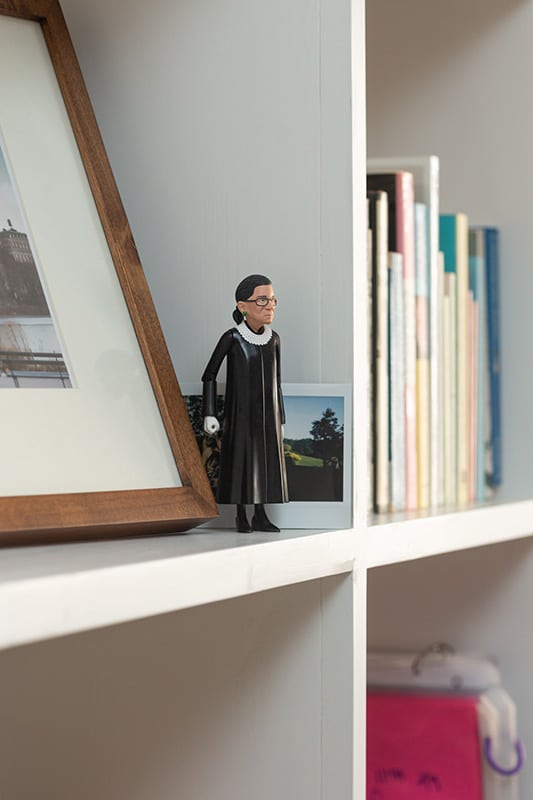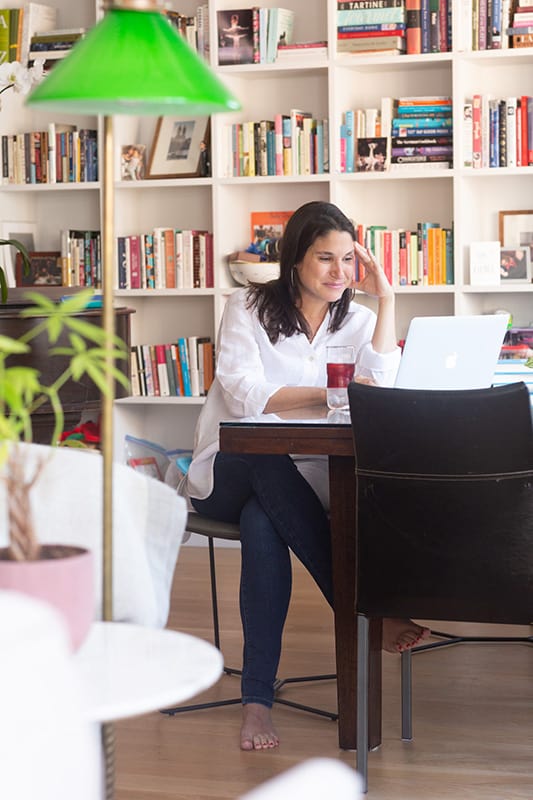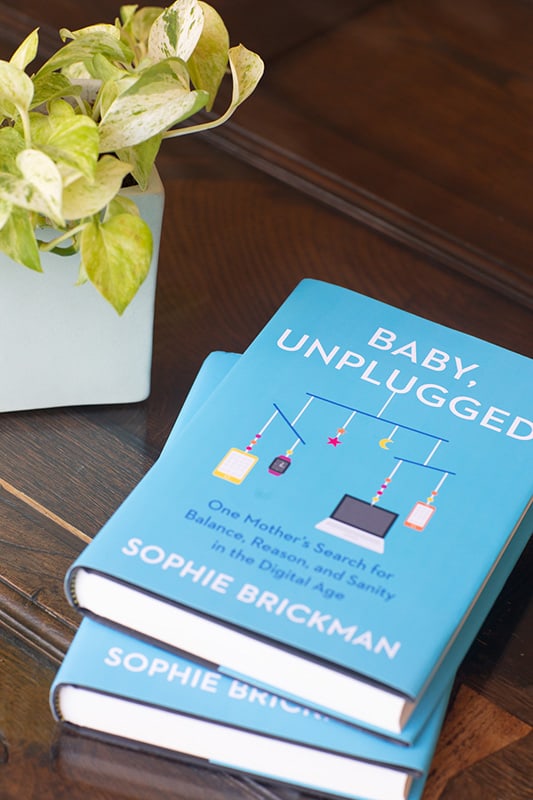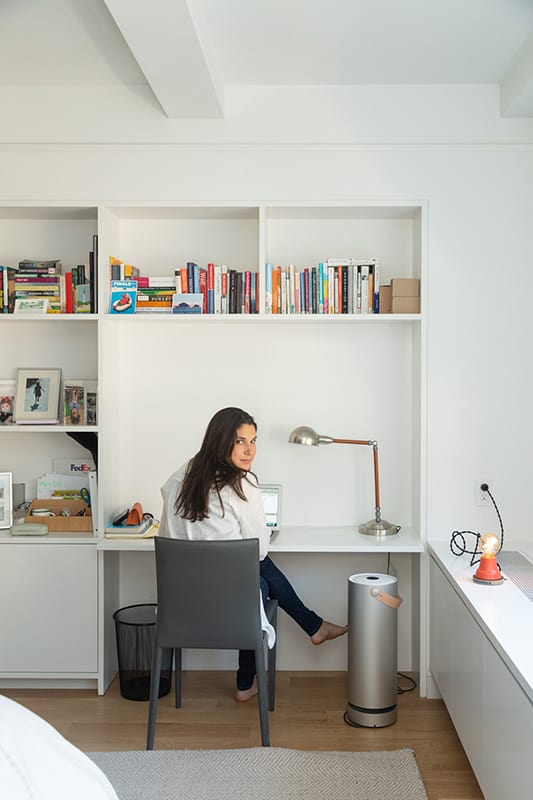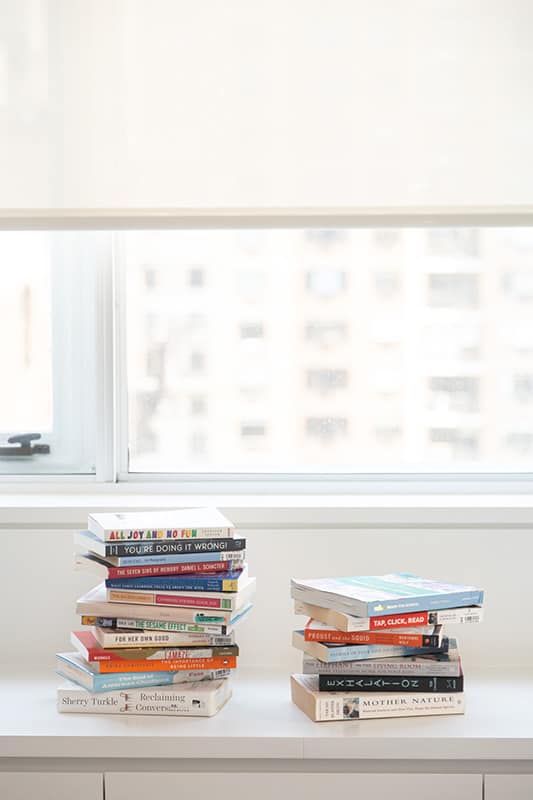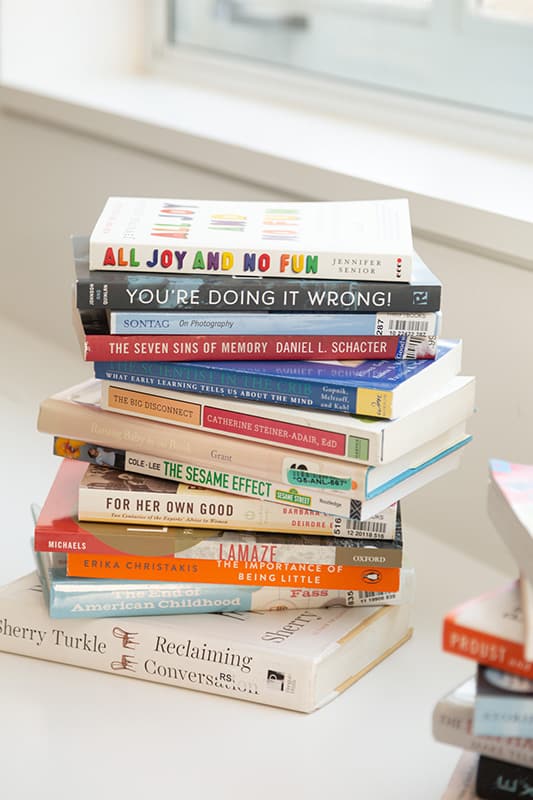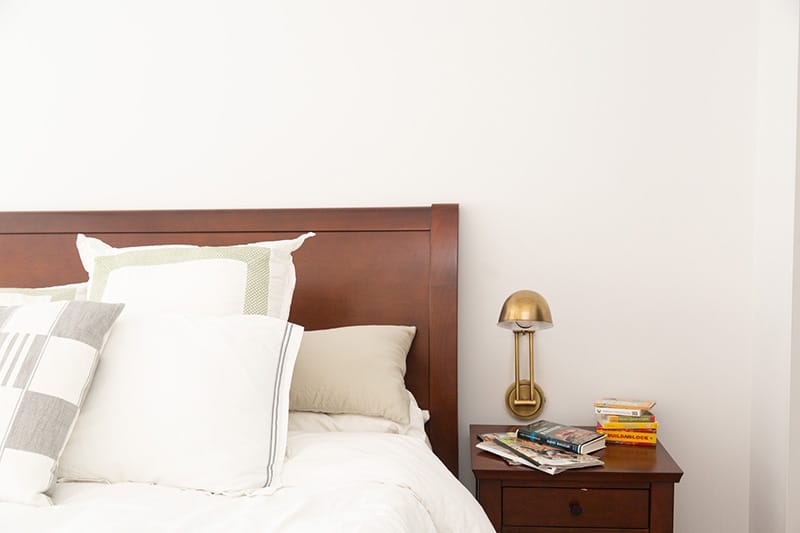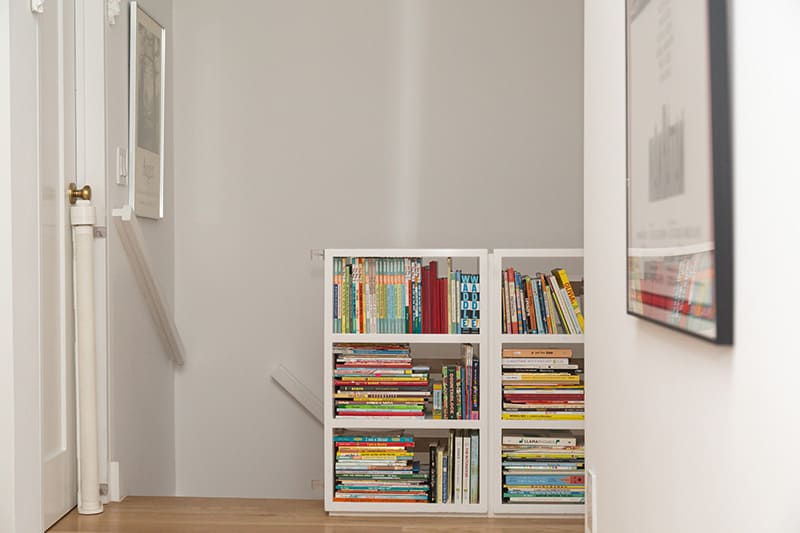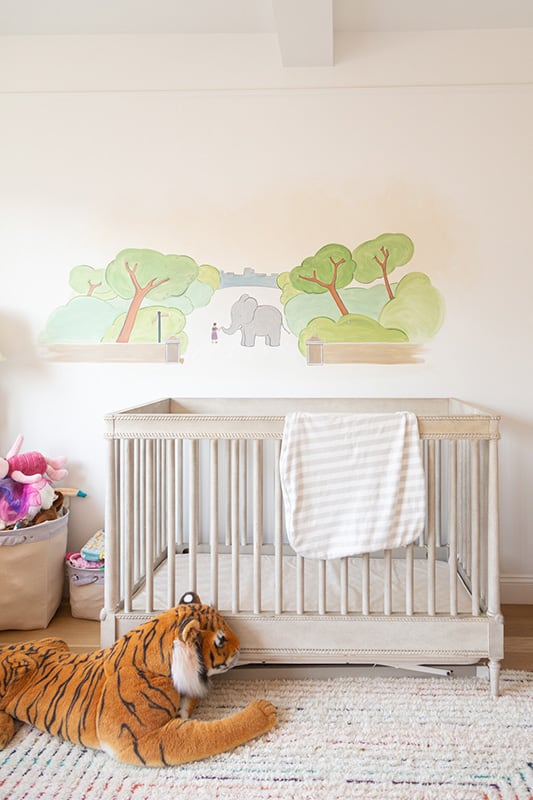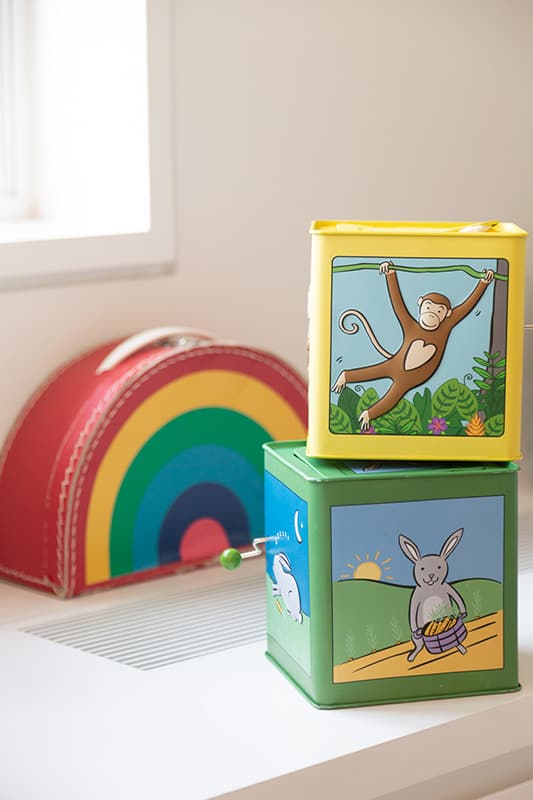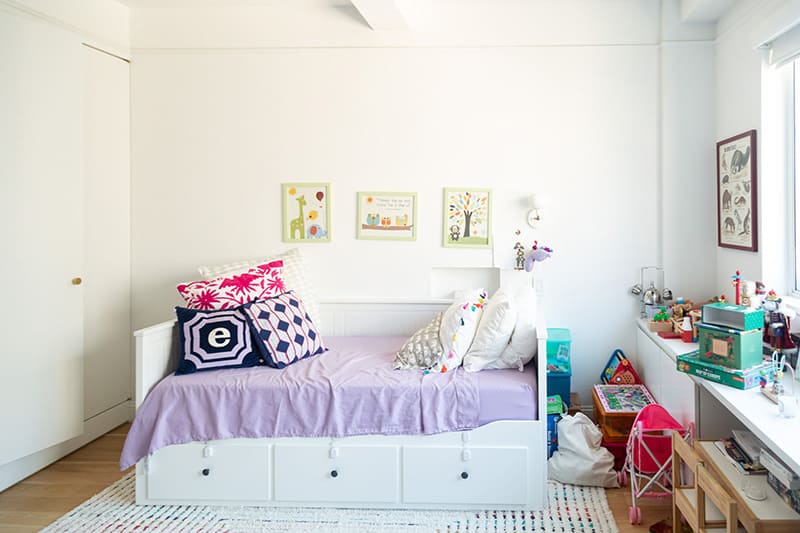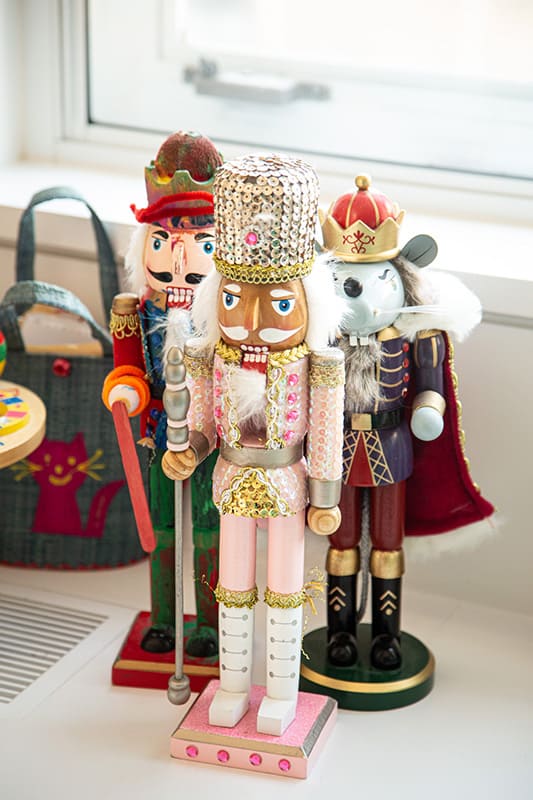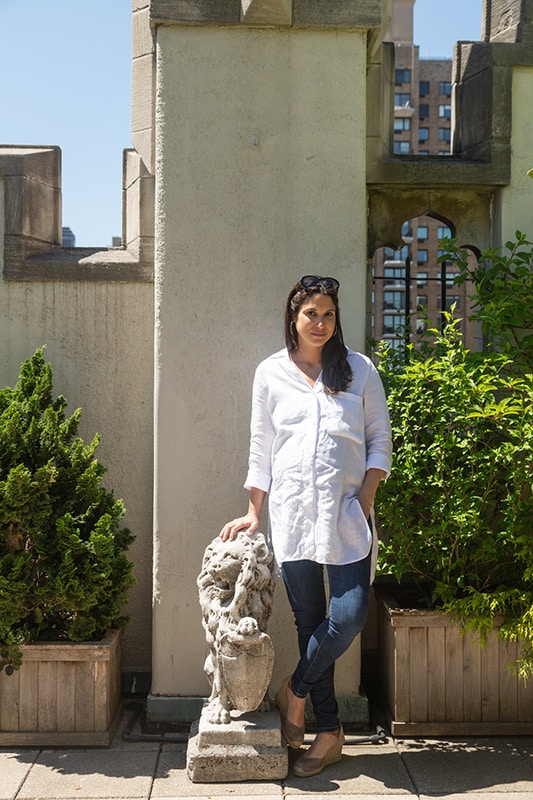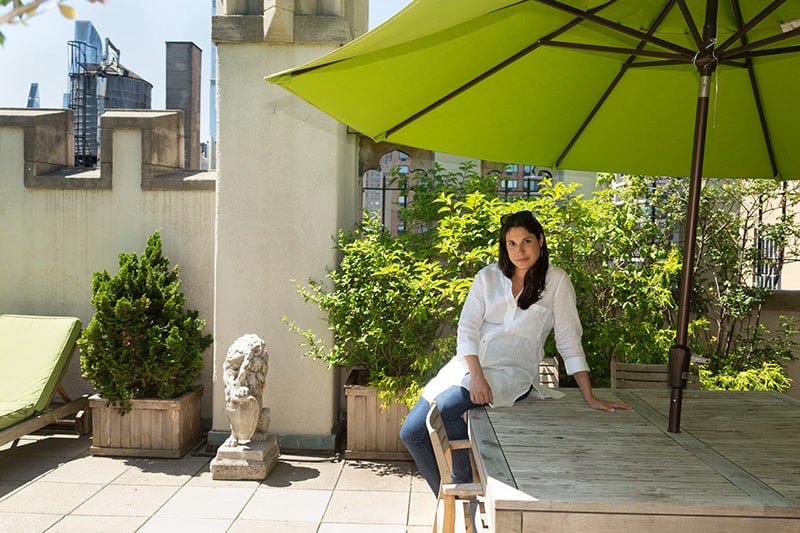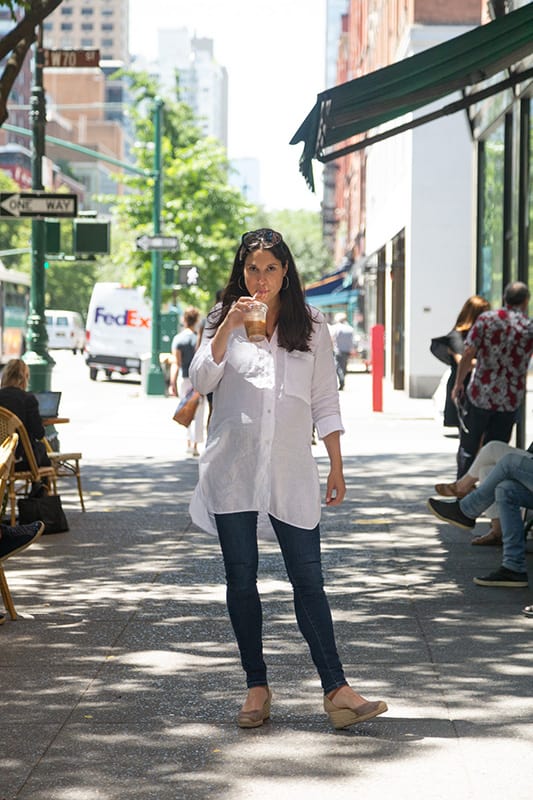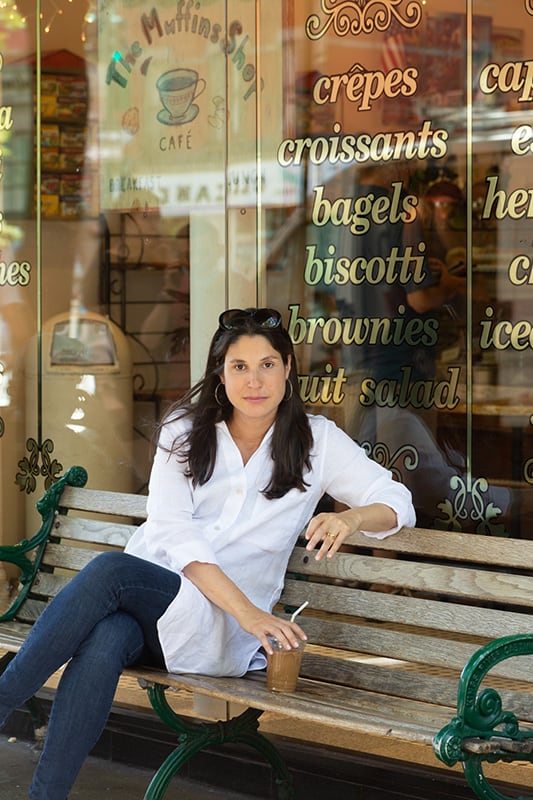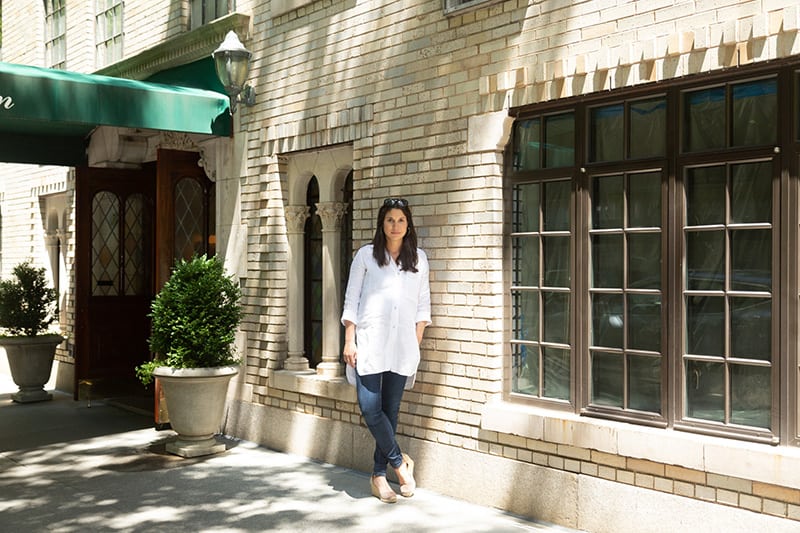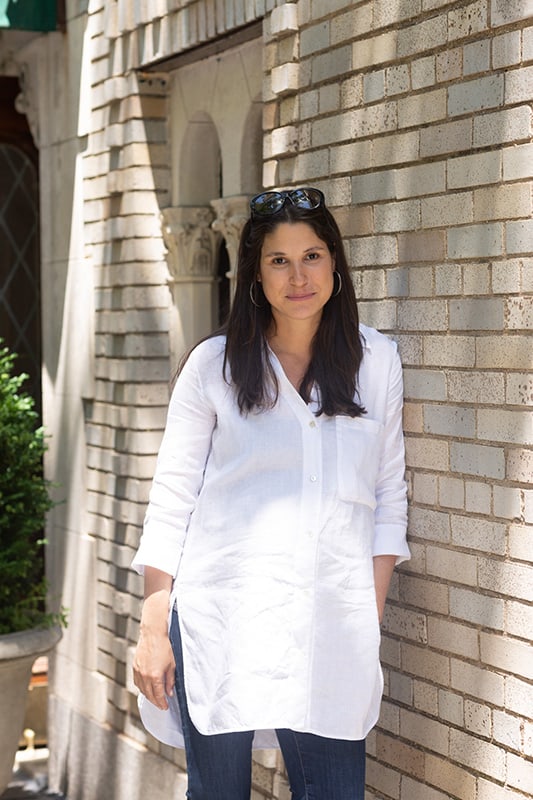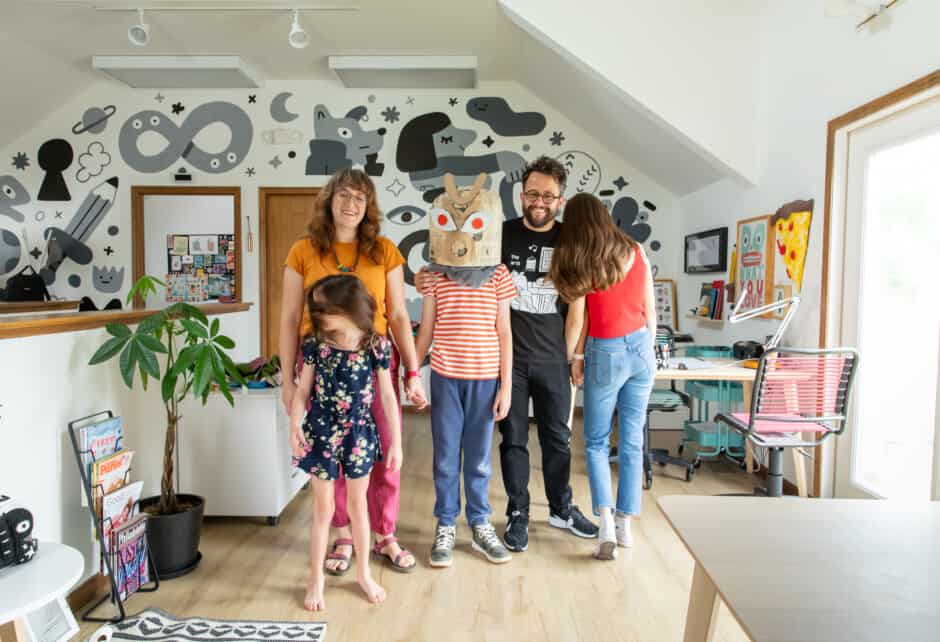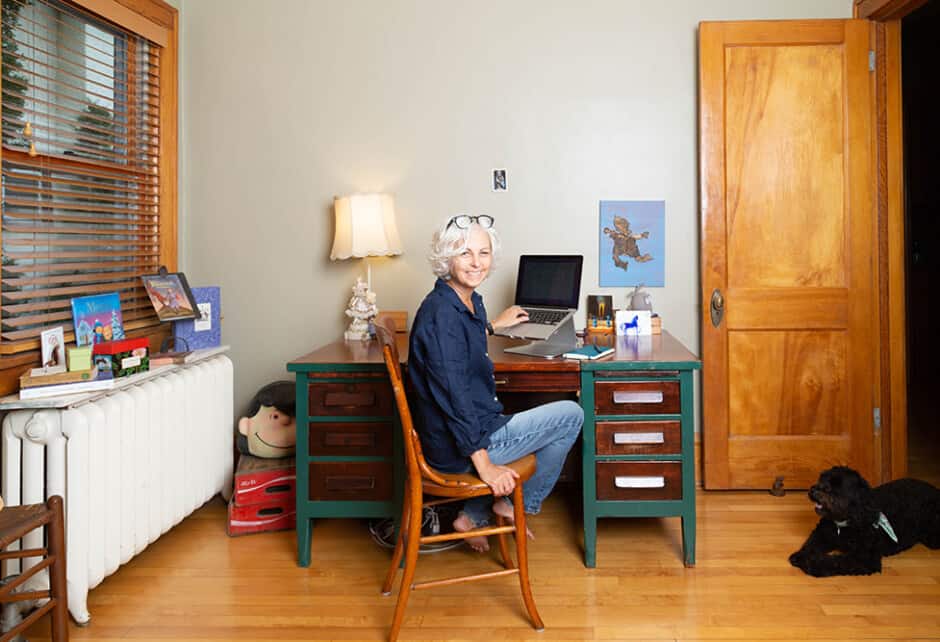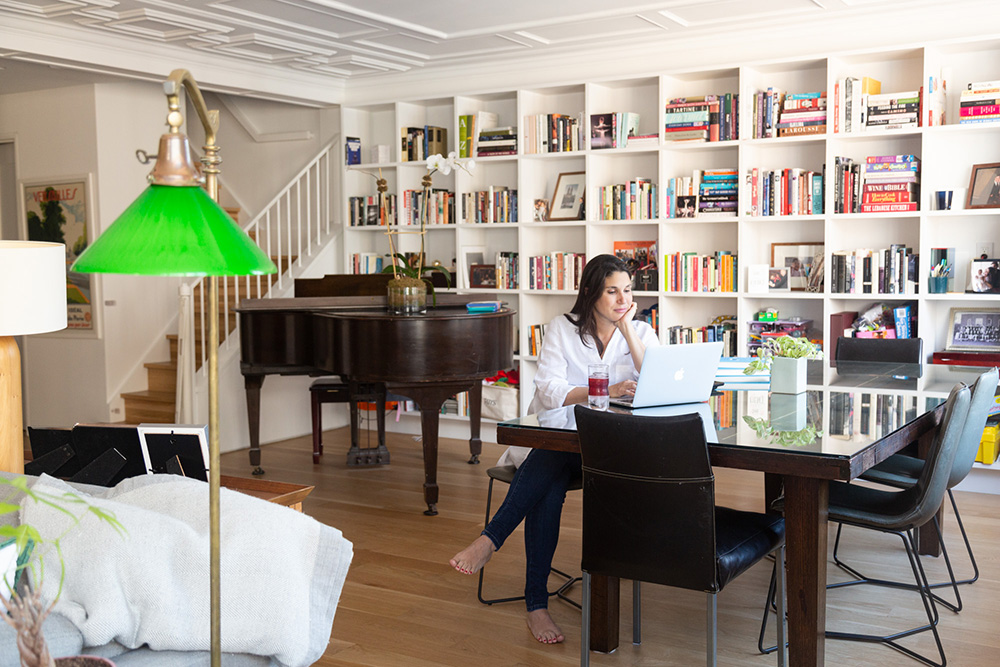
The Bookshelf: Sophie Brickman, Author of Baby, Unplugged
Written by Katie Hintz-Zambrano
Photography by Photographed by Dina Kantor
It’s the modern parent’s never-ending dilemma: how to raise children (and retain your own sanity) in an increasingly digital world. New York-based mother and journalist Sophie Brickman explored this topic from a multitude of angles in her excellent, brand-new book Baby, Unplugged. The refreshing read combines in-depth research with Sophie’s personal experiences as a mother of young children. Filled with practical takeaways (on everything from “smart” baby gadgets to Facebook mom groups) and humorous, relatable stories, it’s a great gift to yourself or to anyone parenting a baby up through elementary-aged kiddos. Just weeks before she gave birth to her third child, we caught up with Sophie in her Manhattan home to hear more about her process and insights.
How would you describe your brand-new book, in a nutshell?
“When our first daughter was born, my husband Dave would often come home with new-fangled tech gadgets that promised to ‘hack’ parenting in one way or another, and all they succeeded in doing was making me more anxious. But I wasn’t exactly sure where to turn to for advice. I knew I wanted to start reporting something about the intersection of technology and parenting, but I also knew that dry, self-helpy parenting books were hard for me to focus on while I was subsisting on four hours of interrupted sleep.”
“My father is also a writer and has always told me that what people care about is other people, so I took that to heart in this book, and combined reporting with memoir. You might say it’s a humorous, personal account of one mother trying to wend her way through the tech morass that surrounds her and her children—and do so while residing with tech’s greatest apologist, her husband. I hope it’s full of real actionable takeaways, but I equally hope that it’s an enjoyable read, and can reach parents out there who are similarly grappling with questions about tech usage and the constant onslaught of conflicting information being flung at them.”
After researching and writing the book, how did your family’s tech use change?
“Instead of feeling either constantly guilty about using technology, or constantly conflicted about it, I came away with a pretty clear set of guidelines that we’re able to employ now. No, not all screen time is going to turn your child into an asocial sociopath. But yes, boredom is good, and free play is good, and basically nothing trumps curling up with your kiddo and a book. It’s helpful to have scientific backing for tech protocol, but equally helpful that I’ve been able to take the time to really think through some of the questions that I think plague so many parents today, who are so overburdened that they are rarely able to take a breath. Our overarching philosophy is to always opt for Magna-Tiles and books before screens, and if we do need to resort to screens, to pick calm, slow, charming children’s programming that we ourselves don’t mind watching.”
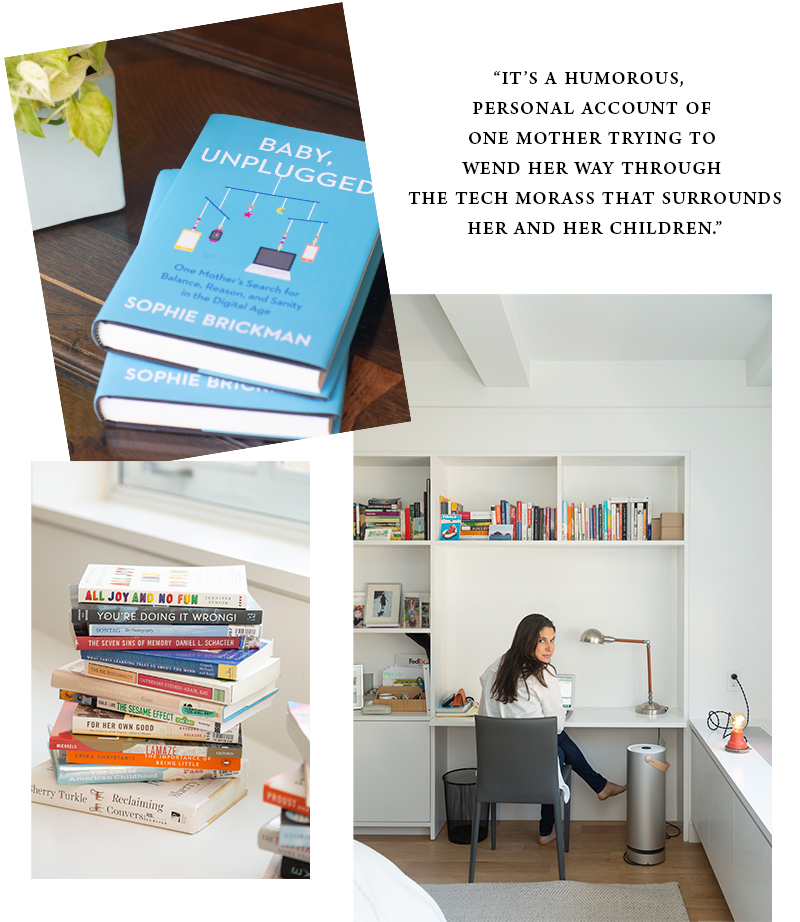
What do you hope readers take away from Baby, Unplugged?
“That they know their child better than Silicon Valley, that they can trust their gut, that they don’t need to turn to a million different places for advice, and that they likely know what’s best for their child even if they don’t think they do. Does your toddler get anxious every time you pull out your phone and stop paying attention to him? Maybe don’t pull out your phone so much. Does your 4-year-old have a temper tantrum when you try to take the iPad away? Maybe don’t use the iPad so much, or change what she’s doing on it. Do you really get calm knowing how many ounces per night your child is eating? Maybe. Maybe not. Just don’t assume that everything additive—be that data logging, ‘enriching’ programming, and more—is actually beneficial. Raising a child, as people have known for millennia, boils down to a few very simple rules: love your child, give them a safe environment to explore and learn, and only feed them a dinner of gummy bears on the very rarest of occasions. You got this.”
Where, physically, did you end up writing this book?
“I live in an unusual building that was built in 1917 largely to house artists. As a result, there are quite a number of little one-room closets that tenants rent to each other that used to store art and various supplies. I was lucky enough to be able to snag one 50-square-foot space for myself a couple floors below our apartment, which I equipped with a chair and computer desk. I’d head there in the mornings before going to work as an editor—it had no Wi-Fi and looked out onto an airshaft, but was deathly quiet and dark and absolutely perfect for me because there were zero distractions. I’d hole up there with stacks of books I brought home from the library, and that’s where I did the majority of my writing. Lots of research was done at the New York Society Library, where I used to go as a child and now take my own children. It’s one of the gems of the city, a gorgeous mansion on the Upper East Side with a fantastic collection, and lots of nooks and crannies where you can work. When I needed to get fresh air or was experiencing writer’s block, I’d walk across the park to the library, and often halfway across I’d figure out what next little chunk I should tackle. Otherwise, I’d grab parts of an hour here or there at home, which any other working parent will be able to appreciate—45 minutes before the girls woke up in the morning, sitting on the chair outside their room; 30 minutes before bed, in the slim timeslot between when they fell asleep and I did, that kind of thing.”
Tell us a little about your background leading up to writing Baby, Unplugged.
“I grew up 8 blocks from where I’m now raising my own family on the Upper West Side of Manhattan. I remember many days at the American Museum of Natural History gazing up at the blue whale, and playing in Central Park, and doing make believe with my older sister in our bedroom. My parents are both in the arts—my mother was a professional ballerina for years, then a film editor, and my father is a screenwriter and director—so our house was always filled with interesting people who had original jobs, which gave me the perhaps crazy notion that I could pursue a slightly unconventional career path. I majored in ‘Social Studies’ at Harvard, which sounds like I studied the Oregon Trail and geography, but in fact had me reading Marx and Freud and various philosophers I was convinced were what erudite collegians should study, even though I would have likely been far happier reading literature. And after college, at the smart urging of my parents, I enrolled in culinary school at night, and eventually went on to work the line as a chef at Gramercy Tavern, which later turned into a career as a food journalist at the San Francisco Chronicle. When I tired of writing about Brussels sprouts and the latest chef drama, I pivoted to writing about my next most interesting topic: my own children.”
Was screen time a big thing in your childhood?
“Well, since my father’s career started in television and then moved onto movies, when I was old enough to start behaving like a little lawyer, I pointed out how ludicrous it was that we weren’t allowed to watch all the shows that our friends talked about at school. (I grew very adept at side stepping conversations about Full House, which I’ve still never seen.) The screen wasn’t verboten, but mostly showed older films—the Marx brothers was on high rotation in our household, as were Tracy/Hepburn comedies, and we’d all watch the U.S. Open each summer together.”
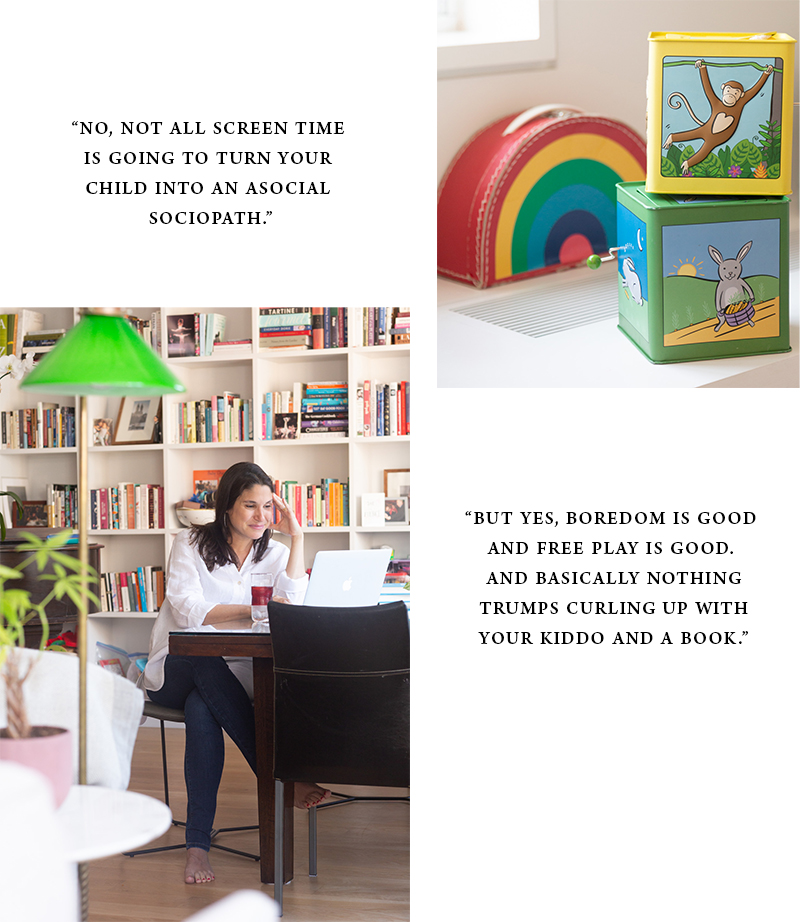
What have you found that women from your mom’s generation think of the concerns of today’s mothers?
“My mother is a true original. She has always trusted her gut, and rarely gets caught up in the hysteria of the moment, so she’s a bit of a hard example to live up to. That being said, she was a constant source of calm for me as I learned how to become a mother myself. It’s helpful to grow up around someone who’s so certain of her convictions. When I’d call her hemming and hawing about this or that parenting hysteria, she’d say, in so many words, ‘You know what to do, it’ll all be fine’—and it often was. I’m not sure what the parenting hysteria of her day was (I spoke to someone of her generation when interviewing them for the book, and she said that after Etan Patz everyone was petrified of kidnapping), but each generation has one, so I’m certain that older generations understand our particular hysteria, however trivial our concerns—to screen time or not to screen time? to SNOO or not to SNOO?—may seem.”
How do you think the concepts of intensive parenting, tech use, and parental burnout relate to each other?
“Oh, they’re all fully intertwined—including the ever-present concept of parental guilt. Most of the tech that is aimed at new parents involves tracking data: how many hours your child is sleeping, how much weight your child is gaining, that kind of thing. And despite the fact that every doctor I spoke to said there is really no reason to monitor, at this level of intensity or consistency, ANY of these metrics after the first few weeks, it’s very hard to look away when the data is available. And then, of course, you start measuring yourself against other parents—ok, that baby is eating a bigger bottle every feed, or gaining more weight, or able to grasp some knobbly ball faster, while my child is wasting away and not hitting any milestones. It all serves to clutter up your brain and foster anxiety. There are a million books to be written on why there is such parental burnout, and how America as a society is collectively responsible—what with its lack of social services and governmental support, and general demotion of parental care on a scale that measures things from a largely capitalist perspective—but Silicon Valley by and large doesn’t help the situation.”
Do you think you’ll do things differently with your third child, vs. how you parented your first two girls? Are you getting the SNOO?!
“Baby three is en route, so already have four SNOOs on the way and both older girls decked out with personal iPads and television sets, to keep them occupied while I log baby data on my phone to the nth degree. Just kidding! I doubt I’ll do things massively differently, save for nixing all the tracking apps and various newborn gadgets that we tried out with our oldest, now that I know that for me, at least, all they do is pile on anxiety and worry instead of quell it. And no, we won’t be using the SNOO. But touch base with me after the baby hasn’t been sleeping through the night consistently in a few weeks.”
How did you fit in writing the book while juggling two kids?
“I got the book deal a few weeks before Charlotte, my second, was born, and handed in the final manuscript two months before she turned two. It was a busy few years! I was working full-time at Hearst as an editor throughout that time, but had a wonderfully supportive editor-in-chief who made sure I could write every morning before coming into work. I was also nursing Charlotte, so I’d get up first thing in the morning and go write for a few hours, then nurse her, then go into the office for the rest of the day. It ended up working well, since my brain started to turn to mush just when she needed to nurse, and then I’d walk to Hearst Tower and recalibrate on the walk.”
Tell us about your creative process.
“Creative process, ha! It would be to freak out, convince myself I had no idea what I was doing, and then call my very close friend, a fellow writer and editor, and he’d talk me off the ledge. I did this on repeat. In all honesty, I could not have done this without him—he was a constant sounding board for ideas, was always ready to read a draft or take a walk in the park, and simply be there to encourage me. The book idea started out as a series of very low-key writing exchanges between the two of us, and somehow putting something in an email felt less daunting than writing it in an official document. It also helps that my father is a writer, and has experienced everything I experienced countless times over. We took many park walks together, and he was able to both commiserate and calm me down when I felt like I’d never get to the finish line. As for nitty-gritty tools of the trade, when I got into the swing of things I learned about Scrivener, which saved me—it’s like Microsoft Word but specifically for writing books, so you can drag and drop big swaths of texts around and see the entire project on one screen if you want to, in outline form. All Hail Scrivener.”
What advice would you give to a fellow writer looking to write their first book?
“Find a first reader whom you trust (or a few, in the form of a writer’s group), an agent who can be your cheerleader, and know that it takes time. I gave myself a goal to write a certain number of words each week, and it was a doable number, which made me feel like I was accomplishing something even if those words were in the form of a rambling email to my friend. Remember: books are long, but they’re made up of chapters, and each chapter is made up of scenes, and you can write a scene in a few days if you have to. Every word down on the page is one less word floating out in the ether, and once they’re down, you can start the next stage of the process: futzing. Just, one foot in front of the other.”
How old are your kids now and what are they most into?
“Ella turned five in May, and Charlotte turned two in May, and Baby Three is en route. Ella and I have been making our way through the Little House On the Prairie books, so there’s a lot of pioneer woman talk going on in our house, about wearing bonnets and breaking horses and tilling the land for harvest. Charlotte is the resident jokester—she’s rarely more happy than when making other people laugh. She also never tires of making Magna-Tile castles for her Cabbage Patch Doll, which she carries with her everywhere and drags through Central Park daily. She’s so attached to it I can rarely wrench it away from her to wash it, but I figure it’s good for her immune system. Or at least that’s what I tell myself. I assume Baby Three will be into nursing and tiny hats.”
What are the biggest tech-related issues you’re dealing with at home today?
“The fact that Ella and Charlotte see Dave and me on screens so often, so it feels hypocritical to make rules for them that we do not follow ourselves.”
You turned in this book’s manuscript just as COVID started shutting the world down. Why is Baby, Unplugged even more crucial in today’s world?
“I know of no pre-school parent who was gung-ho about Zoom preschool or who, particularly after COVID, would opt to sit their kid in front of a screen instead of play with friends. COVID really exposed the detriments of relying on tech, and while it of course served a very necessary purpose during this highly unusual year, I think parents are, perhaps now more than ever, ready to rethink their reliance on technology and come up with a game plan for the new school year. My hope is the conclusions I took away, after speaking to myriad experts in various fields, will help give parents a framework for how to figure out what technology parameters are right for their family. It’s not one-size-fits-all. But it’s helpful to have the information, and not fly blind.”
For more on Sophie, follow her on Twitter @SBrickman and head over to her site SophieBrickman.com. And be sure to scoop up her fabulous new book: Baby, Unplugged.
- Sophie Brickman in her living room on the Upper West Side of Manhattan.
-
How would you describe your brand-new book, in a nutshell?
"When our first daughter was born, my husband Dave would often come home with new-fangled tech gadgets that promised to 'hack' parenting in one way or another, and all they succeeded in doing was making me more anxious. But I wasn’t exactly sure where to turn to for advice. I knew I wanted to start reporting something about the intersection of technology and parenting, but I also knew that dry, self-helpy parenting books were hard for me to focus on while I was subsisting on four hours of interrupted sleep. The only content I found myself able to focus on was about individuals."
"My father is also a writer and has always told me that what people care about is other people, so I took that to heart in this book, and combined reporting with memoir. You might say it’s a humorous, personal account of one mother trying to wend her way through the tech morass that surrounds her and her children—and do so while residing with tech’s greatest apologist, her husband. I hope it’s full of real actionable takeaways, but I equally hope that it’s an enjoyable read, and can reach parents out there who are similarly grappling with questions about tech usage and the constant onslaught of conflicting information being flung at them."
- A #shelfie of some of the family's books.
- Plus, the ever-inspiring Ruth Bader Ginsburg holds court.
-
After researching and writing the book, how did your family's tech use change?
"Instead of feeling either constantly guilty about using technology, or constantly conflicted about it, I came away with a pretty clear set of guidelines that we’re able to employ now. No, not all screen time is going to turn your child into an asocial sociopath. But yes, boredom is good, and free play is good, and basically nothing trumps curling up with your kiddo and a book."
"It’s helpful to have scientific backing for tech protocol, but equally helpful that I’ve been able to take the time to really think through some of the questions that I think plague so many parents today, who are so overburdened that they are rarely able to take a breath."
"Our overarching philosophy is to always opt for Magna-Tiles and books before screens, and if we do need to resort to screens, to pick calm, slow, charming children’s programming that we ourselves don’t mind watching."
- What do you hope readers take away from Baby, Unplugged?"That they can trust their gut, that they don’t need to turn to a million different places for advice, and that they likely know what’s best for their child even if they don’t think they do. Does your toddler get anxious every time you pull out your phone and stop paying attention to him? Maybe don’t pull out your phone so much. Does your 4-year-old have a temper tantrum when you try to take the iPad away? Maybe don’t use the iPad so much, or change what she’s doing on it. Do you really get calm knowing how many ounces per night your child is eating? Maybe. Maybe not. Just don’t assume that everything additive—be that data logging, 'enriching' programming, and more—is actually beneficial. Raising a child, as people have known for millennia, boils down to a few very simple rules: love your child, give them a safe environment to explore and learn, and only feed them a dinner of gummy bears on the very rarest of occasions. You got this."
-
Where, physically, did you end up writing this book?"I live in an unusual building that was built in 1917 largely to house artists. As a result, there are quite a number of little one room closets that tenants rent to each other that used to store art and various supplies. I was lucky enough to be able to snag one 50-square-foot space for myself a couple floors below our apartment, which I equipped with a chair and computer desk. I’d head there in the mornings before going to work as an editor—it had no WiFi and looked out onto an airshaft, but was deathly quiet and dark and absolutely perfect for me because there were zero distractions. I’d hole up there with stacks of books I brought home from the library, and that’s where I did the majority of my writing."
"Lots of research was done at the New York Society Library, where I used to go as a child and now take my own children. It’s one of the gems of the city, a gorgeous mansion on the Upper East Side with a fantastic collection, and lots of nooks and crannies where you can work. When I needed to get fresh air or was experiencing writer’s block, I’d walk across the park to the library, and often halfway across I’d figure out what next little chunk I should tackle."
"Otherwise, I’d grab parts of an hour here or there at home, which any other working parent will be able to appreciate—45 minutes before the girls woke up in the morning, sitting on the chair outside their room; 30 minutes before bed, in the slim timeslot between when they fell asleep and I did, that kind of thing."
- A stack of some of Sophie's research materials for Baby, Unplugged.
- A diverse collection to ruminate on the times we're in—from Jennifer Senior's All Joy and No Fun: The Paradox of Modern Parenthood to Sherry Turkle's Reclaiming Conversation: The Power of Talk in a Digital Age.
-
Tell us a little about your background leading up to writing Baby, Unplugged."I grew up 8 blocks from where I’m now raising my own family on the Upper West Side of Manhattan. I remember many days at the American Museum of Natural History gazing up at the blue whale, and playing in Central Park, and doing make believe with my older sister in our bedroom."
"My parents are both in the arts—my mother was a professional ballerina for years, then a film editor, and my father is a screenwriter and director—so our house was always filled with interesting people who had original jobs, which gave me the perhaps crazy notion that I could pursue a slightly unconventional career path."
"I majored in 'Social Studies' at Harvard, which sounds like I studied the Oregon Trail and geography, but in fact had me reading Marx and Freud and various philosophers I was convinced were what erudite collegians should study, even though I would have likely been far happier reading literature."
"And after college, at the smart urging of my parents, I enrolled in culinary school at night, and eventually went on to work the line as a chef at Gramercy Tavern, which later turned into a career as a food journalist at the San Francisco Chronicle. When I tired of writing about brussels sprouts and the latest chef drama, I pivoted to writing about my next most interesting topic: my own children."
- Was screen time a big thing in your childhood?"Well, since my father’s career started in television and then moved onto movies, when I was old enough to start behaving like a little lawyer, I pointed out how ludicrous it was that we weren’t allowed to watch all the shows that our friends talked about at school. (I grew very adept at side stepping conversations about Full House, which I’ve still never seen.) The screen wasn’t verboten, but mostly showed older films—the Marx brothers was on high rotation in our household, as were Tracy/Hepburn comedies, and we’d all watch the U.S. Open each summer together."
-
What have you found that women from your mom's generation think of the concerns of today's mothers?"My mother is a true original. She has always trusted her gut, and rarely gets caught up in the hysteria of the moment, so she’s a bit of a hard example to live up to. That being said, she was a constant source of calm for me as I learned how to become a mother myself. It’s helpful to grow up around someone who’s so certain of her convictions. When I’d call her hemming and hawing about this or that parenting hysteria, she’d say, in so many words, you know what to do, it’ll all be fine—and it often was."
"I’m not sure what the parenting hysteria of her day was (I spoke to someone of her generation when interviewing them for the book, and she said that after Etan Patz everyone was petrified of kidnapping), but each generation has one, so I’m certain that older generations understand our particular hysteria, however trivial our concerns—to screen time or not to screen time? to SNOO or not to SNOO?—may seem."
-
How do you think the concepts of intensive parenting, tech use, and parental burnout relate to each other?"Oh, they’re all fully intertwined—including the ever-present concept of parental guilt. Most of the tech that is aimed at new parents involves tracking data: how many hours your child is sleeping, how much weight your child is gaining, that kind of thing. And despite the fact that every doctor I spoke to said there is really no reason to monitor, at this level of intensity or consistency, ANY of these metrics after the first few weeks, it’s very hard to look away when the data is available. And then, of course, you start measuring yourself against other parents—ok, that baby is eating a bigger bottle every feed, or gaining more weight, or able to grasp some knobbly ball faster, while my child is wasting away and not hitting any milestones. It all serves to clutter up your brain and foster anxiety."
"There are a million books to be written on why there is such parental burnout, and how America as a society is collectively responsible—what with its lack of social services and governmental support, and general demotion of parental care on a scale that measures things from a largely capitalist perspective—but Silicon Valley by and large doesn’t help the situation."
-
Do you think you'll do things differently with your third child, vs. how you parented your first two girls? Are you getting the SNOO?!"We came home from the hospital with Jules yesterday, so already have four SNOOs on the way and both older girls decked out with personal iPads and television sets, to keep them occupied while I log baby data on my phone to the nth degree. Just kidding!"
"I doubt I’ll do things massively differently, save for nixing all the tracking apps and various newborn gadgets that we tried out with our oldest, now that I know that for me, at least, all they do is pile on anxiety and worry instead of quell it. And no, we won’t be using the SNOO. But touch base with me after Jules hasn’t been sleeping through the night consistently in a few weeks."
- How did you fit in writing the book while juggling two kids?"I got the book deal a few weeks before Charlotte, my second, was born, and handed in the final manuscript two months before she turned two. It was a busy few years! I was working full-time at Hearst as an editor throughout that time, but had a wonderfully supportive editor-in-chief who made sure I could write every morning before coming into work. I was also nursing Charlotte, so I’d get up first thing in the morning and go write for a few hours, then nurse her, then go into the office for the rest of the day. It ended up working well, since my brain started to turn to mush just when she needed to nurse, and then I’d walk to Hearst Tower and recalibrate on the walk."
-
Tell us about your creative process. "Creative process, ha! It would be to freak out, convince myself I had no idea what I was doing, and then call my very close friend, a fellow writer and editor, and he’d talk me off the ledge. I did this on repeat. In all honesty, I could not have done this without him—he was a constant sounding board for ideas, was always ready to read a draft or take a walk in the park, and simply be there to encourage me."
"The book idea started out as a series of very low-key writing exchanges between the two of us, and somehow putting something in an email felt less daunting than writing it in an official document. It also helps that my father is a writer, and has experienced everything I experienced countless times over. We took many park walks together, and he was able to both commiserate and calm me down when I felt like I’d never get to the finish line."
"As for nitty-gritty tools of the trade, when I got into the swing of things I learned about Scrivener, which saved me—it’s like Microsoft Word but specifically for writing books, so you can drag and drop big swaths of texts around and see the entire project on one screen if you want to, in outline form. All Hail Scrivener."
- What advice would you give to a fellow writer looking to write their first book? "Find a first reader whom you trust (or a few, in the form of a writer’s group), an agent who can be your cheerleader, and know that it takes time. I gave myself a goal to write a certain number of words each week, and it was a doable number, which made me feel like I was accomplishing something even if those words were in the form of a rambling email to my friend. Remember: books are long, but they’re made up of chapters, and each chapter is made up of scenes, and you can write a scene in a few days if you have to. Every word down on the page is one less word floating out in the ether, and once they’re down, you can start the next stage of the process: futzing. Just, one foot in front of the other."
- How old are your kids now and what are they most into? "Ella turned five in May, and Charlotte turned two in May, and Baby Jules just arrived. Ella and I have been making our way through the Little House On the Prairie books, so there’s a lot of pioneer woman talk going on in our house, about wearing bonnets and breaking horses and tilling the land for harvest. Charlotte is the resident jokester—she’s rarely more happy than when making other people laugh. She also never tires of making Magna-Tile castles for her Cabbage Patch Doll, which she carries with her everywhere and drags through Central Park daily. She’s so attached to it I can rarely wrench it away from her to wash it, but I figure it’s good for her immune system. Or at least that’s what I tell myself. Mostly Jules is into nursing and tiny hats."
- What are the biggest tech-related issues you're dealing with at home today?"The fact that Ella and Charlotte see Dave and me on screens so often, so it feels hypocritical to make rules for them that we do not follow ourselves."
- You turned in this book's manuscript just as Covid started shutting the world down. Why do you think Baby, Unplugged is even more crucial in today's world?"I know of no pre-school parent who was gung-ho about Zoom preschool or who, particularly after Covid, would opt to sit their kid in front of a screen instead of play with friends. Covid really exposed the detriments of relying on tech, and while it of course served a very necessary purpose during this highly unusual year, I think parents are, perhaps now more than ever, ready to rethink their reliance on technology and come up with a game plan for the new school year. My hope is the conclusions I took away, after speaking to myriad experts in various fields, will help give parents a framework for how to figure out what technology parameters are right for their family. It’s not one-size-fits-all. But it’s helpful to have the information, and not fly blind."
-
For more on Sophie, follow her on Twitter @SBrickman and head over to her site SophieBrickman.com.
And be sure to scoop up her fabulous new book: Baby, Unplugged.
Share this story

